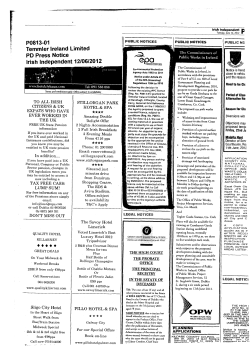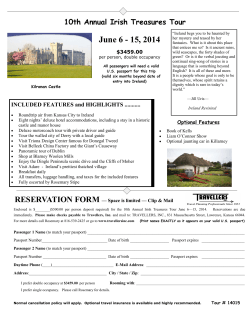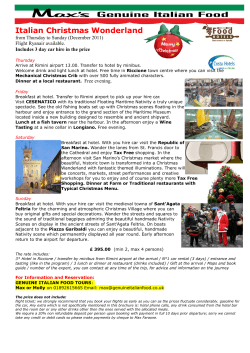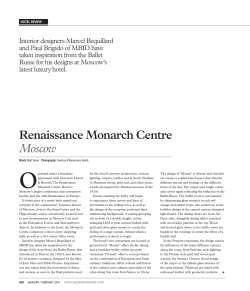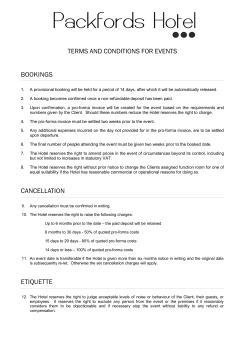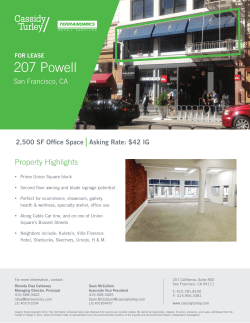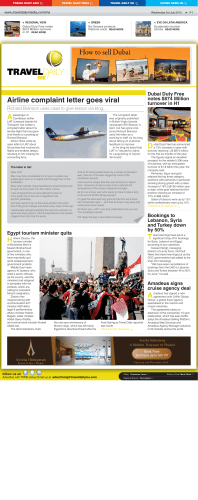
HOTEL FURNITURE An Ireland perspective
HOTEL FURNITURE NOVEMBER 2000 An Ireland perspective Expansion of Ireland market just under IR£20m/Stg£16m. Ten companies have 90% market share. Important factors are reliability, prompt delivery and value for money. Greatest opportunity is in refurbishment market. New build market may be reaching saturation. Topline Summary Scope of Report This Report covers the new build and refurbishment hotel furniture market for bedrooms, dining rooms, restaurants, bars and reception areas. This includes fitted bedroom furniture (known as case goods) and beds, plus accessories such as table lamps, mirrors and pictures, and moveable dining room, restaurant, bar and reception area furniture. Contents Topline Summary 1 Market Size 3 Market Characteristics 6 Manufacturers in Ireland 8 Route to Market 8 Product and BuyerTrends 9 Marketing and Promotion 10 Competitor Assessment 10 Future Opportunities 11 List of Hotel Chains and Groups 12 Reports and Other Publications 16 Useful Web Sites This publication has been produced by: InterTradeIreland, Enterprise Ireland, LEDU and IDB for Northern Ireland. P A G E 1 16 The market for hotel furniture in both the Republic and in Northern Ireland is currently estimated to be worth just under IR£20 million/Stg£16 million. Of this total, IR£9.1 million/Stg£7.3 million is new build and IR£10.4 million/Stg£8.3 million is refurbishment. The new build market in the Republic is more than 4 times that of Northern Ireland, and the refurbishment market in the Republic is about 9 times that of Northern Ireland. Irish hotel furniture is primarily a project market, especially for fitted furniture. It is also a local market due to the high level of contact, negotiation and service required throughout the fitting and furnishing process. The Irish hotel furniture industry consists largely of 10 companies, who concentrate mainly on case goods. Between them they have a 90% market share.They have built up good relationships with architects and hotels based on their track record. The decision making process in furnishing a hotel usually involves to varying degrees the designer, the hotelier and the building contractor. All three may input purchasing and supplier selection decisions. Refurbishment usually occurs 7-8 years after opening and every 4-5 years after that. There are different refurbishment cycles for bedrooms and beds, public areas and dining rooms. Promotion of hotel furniture mainly involves direct contact by sales representatives with potential buyers and specifiers. A lot of business is won by word-of-mouth and good reputation. The most important factors that buyers consider when choosing a supplier are reliability, prompt delivery and value for money. All things being equal, buyers prefer to deal with a local manufacturer. Overseas suppliers have the disadvantage in Ireland of distance during selling and technical negotiation. The new build market may be reaching saturation.The main opportunity for Irish hotel furniture manufacturers is in refurbishment, which will continue to grow as existing hotels keep pace with new ones.There may be scope to stimulate business by proactively selling to potential customers. Market Size The market for hotel furniture in both the Republic and in Northern Ireland is currently estimated to be worth just under IR£20 million/Stg£16 million. Of this total, IR£9.1 million/Stg£7.3 million is new build and IR£10.4 million/Stg£8.3 million is refurbishment. The new build market in the Republic is more than 4 times that of Northern Ireland, and the refurbishment market in the Republic is about 9 times that of Northern Ireland. Market Breakdown New Build (£’000) Type of furniture Bedroom Refurbishment (£’000) ROI NI IR£7,143 IR£1,648 Stg£5,714 Stg£1,318 Type of furniture Beds Casegoods Dining room Subtotal See Costings section for the cost of individual items Source: Industry interviews and Bord Failte. TOTAL ROI & NI IR£297 IR£75 Stg£237 Stg£60 IR£7,440 IR£1,723 Stg£5,952 Stg£1,379 IR£9,164 Stg£7,331 Dining room Subtotal ROI NI IR£1,980 IR£225 Stg£1,584 Stg£180 IR£6,710 IR£762 Stg£5,368 Stg£610 IR£704 IR£80 Stg£563 Stg£64 IR£9,394 IR£1,067 Stg£7,515 Stg£854 TOTAL IR£10,461 ROI & NI Stg£8,369 Some figures have been rounded Republic of Ireland New build: Demand for hotel furniture is driven by the number of new bedrooms built. In 1999, there were 2,406 net new bedrooms in the Republic. New build has been slowing over the last few years to a current level of about 2,000 new rooms per year. An estimated IR£14 million, Stg£11.2 million will be spent on furnishing new hotel bedrooms in the Republic in the two-year period 2000 and 2001.This assumes a spend of about IR£3,500 per bedroom, excluding soft furnishings. Room occupancy rates decreased from 70% in 1997 to 67% in 1998, which may signal the industry to ease off on further additions. P A G E 3 About IR£297,000/Stg£237,000 worth of restaurant/dining room tables and chairs will be 1 needed to furnish new hotels due to open in 2000. This figure is likely to be higher, taking into account that hotels may have ancillary sideboards in the dining room and may have a function room. Refurbishment: Bedrooms and public areas in hotels have a refurbishment cycle of five to seven years. Based on the hotel room stock figure of 36,282 (see table), and excluding one and two star hotels, this suggests that at least 4,400 rooms will be refurbished annually. Given that the number of dining places is the same as that of hotel bedrooms, 4,400 dining places are also likely to be refurbished each year.This represents IR£704,000/Stg£563,200 worth of restaurant and dining room furniture. The following table shows the number of hotel bedrooms of each classification as at 2 November 1999. ROI Hotel Bedroom by Classification as at November 1999 18,000 16,000 14,000 12,000 10,000 8,000 6,000 4,000 2,000 0 Number of hotel bedrooms 5* 4* 3* 2* 1* not registered Refurbishing U* X* Northern Ireland New build: Six new hotels, with a total of 471 new rooms, are planned for 2000 (see Appendix 1).The estimated bedroom furniture spend is IR£1.65 million/Stg£1.32 million, excluding soft furnishings. 1 2 We assume that a 2/3 star hotel spends IR£70 per chair and IR£60 per table and a 4/5 star hotel spends IR£150 per chair and the same for a table. Of the hotels opening in 2000, approximately 1,298 rooms will be in 2/3 star hotels and 743 rooms will be in 4/5 star hotels. Source: Bord Failte/Irish Tourist Board. P A G E 4 About IR£75,000 /Stg£60,000 will be spent on tables and chairs for the restaurant and dining room areas. Function rooms and ancillary sideboards are likely to increase this to IR£100,000/Stg£80,000. Refurbishment: Total hotel room stock in NI at the end of 1999 was 4,882, a decrease from 4,899 rooms at the beginning of 1999 as a result of five hotel closures. Room occupancy rates decreased from 58% in 1997 to 57% in 1998.This will temper further expansion and limit the funds available for refurbishment. Based on the refurbishment cycle of seven years for bedrooms and restaurant/dining room areas, an estimated 500 bedrooms will be refurbished each year along with 500 dining places. Refurbishing these dining places would be around IR£80,000/Stg£64,000. In reality the refurbishment rate and spend are likely to be less, due to the low occupancy rates. The following table shows the number of hotel bedrooms in Northern Ireland by classification 3 for 1997 and 1998. Number of Hotel Bedrooms – Northern Ireland by Classification, 1997 and 1998 2500 Number of hotel bedrooms 1997 Number of hotel bedrooms 1998 2000 1500 1000 ‘Other’ covers hotels that are not classified or are refurbishing and are therefore between classifications. 500 0 3 Source: "Ireland and Northern Ireland Hotel Industry Survey 1999", Horwath Bastow Charleton. P A G E 5 5*and 4* 3* 2*and 1* Other Market Characteristics Irish hotel furniture is primarily a project market, especially for fitted furniture. It is also a local market due to the high level of contact, negotiation and service required throughout the fitting and furnishing process. Segmentation The market can be segmented as follows, in descending order of expenditure: • Five star castle and stately home hotels and five/four star boutique-style or designer hotels are usually individual hotels and not part of a chain or privately owned group. There is an overall budget for furnishing the entire hotel.Townhouse hotels and castle/stately home hotels use a mix of genuine and reproduction antique furniture. The spend in these hotels is high, reflecting their top of the market clientele. • Modern five and four star hotels target the high end of the business market.These hotels tend to be designed to a standard international formula.They generally have a specific furniture budget for the bedrooms and spend more on better quality beds and carpets.They have conference and ballroom facilities and offer a comprehensive range of services. Many have a dedicated business floor with facilities closed to non-guests. • Value-oriented four and three star hotels cater for the mainstream business and family market.They have more beds per room and offer a room price rather than a price per person. • Budget hotels/motels are usually strategically located on major routes and are aimed at the lower end of the business market and families.They offer well appointed but basic rooms and minimal ancillary services. The one and two star hotels, ungraded hotels, hostels, etc. are outside the mainstream contract market.They mostly buy furniture as required from the trade sections of furniture retailers or direct from factories. P A G E 6 Costings The spend on hotel furniture is often decided towards the end of the building or refurbishment project and depends on the amount left in the budget.The industry guideline for costing restaurant/dining room furniture in a hotel assumes a ratio of one dining space per bedroom. Calculations in this Report are based on this industry ratio.The following table shows details of furniture prices for each area of the hotel. However, it should be noted that some hotels may not have this ratio and others may have a larger number of dining places for restaurant only customers. The following table gives furniture prices for each main hotel area: Costings Beds Top quality double IR£375-IR£500 Standard quality double IR£300 Restaurant/dining room Public areas Bistro style chair IR£70 Small foyer area Standard chair IR£100 IR£10,000-IR£12,000 Elaborate chair IR£150-IR£160 Large foyer area IR£50,000-IR£60,000 Zip and link IR£300 Standard MDF top table IR£50-IR£60 Standard quality single IR£150 High quality table IR£150-IR£200 Case Goods for bedrooms Bar Reception area Furniture Bar chair/stool IR£25-IR£30 This is included in the overall hotel IR£2,500-IR£3,000 per bedroom Bar table IR£25-IR£30 budget and spend depends entirely on the interior designer and how much the hotel is willing to spend on each item. Labour and fitting IR£300-IR£400 per bedroom P A G E 7 Manufacturers in Ireland The Irish hotel furniture industry consists largely of 10 companies, who concentrate mainly on case goods. Between them they have a 90% market share.They have built up good relationships with architects and hotels based on their track record. In beds, the market is dominated by Kayfoam Woolfson, which has the American King Koil licence for Ireland. The main Irish suppliers of hotel furniture are: Bed manufacturers Wooden furniture/Case goods manufacturers. Kayfoam Woolfson Classic Furniture Designs Ltd. Kelletts Beola Crafts Ltd. Spring Air David Parle Homelee Caulfields Castlebrook Furniture & Design O’Donnell Design Ltd. Route to Market The decision making process in furnishing a hotel usually involves to varying degrees the designer, the hotelier and the building contractor. All three may input to purchasing and supplier selection decisions. In some cases the building contractor may be responsible for the purchase of furniture but the designer may have set ideas about which supplier to use. A large number of interior design companies provide a full turnkey service to hotels in furnishing bedrooms.They can provide complete costings for furnishing bedrooms as well as a breakdown of costs for soft furnishings, hard furnishings and beds.They can suggest furniture suppliers to the hotelier and can source the furnishings as part of their overall service.These companies include: • • • • • • • • Patton Interiors Salmon Interiors JP Glass Cotton Box Contracts Peter Johnson Interiors Brian S. Nolan Angela O’Connor Michael Kinsella Interiors Many Irish hotels are part of publicly or privately owned groups. If a furniture manufacturer can become a supplier to one hotel within a group, it can open up the possibility of supplying all hotels within that group. In this way, an initial small contract may generate substantial business.The hotel manager should be the first point of contact at each hotel in a group to identify who is responsible for the purchase of hotel furniture. P A G E 8 Product and Buyer Trends New build Hotels vary enormously in their furniture spend. Even two hotels of similar standard could have greatly differing budgets for furnishing. Even within a chain of hotels like Jurys Doyle Hotel Group, the budget for furniture can vary from hotel to hotel and from floor to floor. Executive floors can have rooms with desks. Bedrooms on different floors can be decorated to different themes.The same beds are used on each floor but other furniture can differ.The designer will generally look at what is available in the market and pass this information to the hotelier. It can take up to four months to finalise the budget. Plumbing and electrical fittings are included in the overall hotel construction budget and not in the room budget. There is a trend in Dublin towards one-off boutique-style or designer hotels involving wellknown designers such as Terence Conran or John Rocha.These hotels usually have an overall budget for fitting out and furnishing the entire hotel.The furniture and furnishings are specially designed and manufactured.The budget changes considerably during the course of the project, as the designer often has a free rein and may decide, for example, to cut back on bedroom furniture in order to purchase art for the lobby. Refurbishment New hotels generally carry out the first refurbishment of their bedrooms seven or eight years after opening, depending on the quality of the original work and whether or not the existing patterns and colour schemes match up with the plans for refurbishment. Refurbishment of the bedrooms may or may not include replacing the beds as this is often done independently of the total refurbishment. Some hotels replace beds more frequently than others, depending on the quality of the original beds. Most new hotels have a bed replacement cycle of eight to ten years.The industry norm seems to be to replace the case goods every second time the bedroom is refurbished. For example, in an existing hotel the carpets, curtains and bedspreads may be replaced every four or five years whereas the case goods will be replaced every eight or ten years. Public areas are usually refurbished for the first time after seven or eight years, and then every five to seven years.The refurbishment process in public areas can be staggered, with carpets replaced one year and furniture the next year. The refurbishment cycle of the bar and restaurant/dining room depends on the location of the hotel. A busy centrally located hotel with a large food and drink trade that does not depend solely on overnight guests would obviously refurbish more often than a quiet hotel located outside a city or town. P A G E 9 Marketing and Promotion Promotion of hotel furniture mainly involves direct contact by sales representatives of manufacturers with potential buyers and specifiers, such as architects and interior designers. For Irish and international hotel groups the contact point is usually the central purchasing office. A lot of business is won by word-of-mouth and good reputation. Exhibitions Exhibitions are an important promotional medium for promotion and making contacts. They are also sources of information on trends in the industry. Leading hotel industry exhibitions include: • Hotel Interiors Show, Dublin: A hotels, restaurants and pub interiors exhibition which is held each February at the Burlington Hotel. • Hotel Olympia, London: This exhibition is for all suppliers to the hotel industry including furniture suppliers. It is held every two years and attracts a worldwide audience.The next Hotel Olympia is in February 2002. • Hospitality, Birmingham: Takes place every two years when Hotelympia is not held. The next exhibition is in January 2001. Irish Hotels Federation Many Irish hotel furniture and bedding manufacturers and interior designers are associate members of the Irish Hotels Federation.Their products and services are listed in the official IHF list of suppliers to the hotel industry and they are entitled to take a stand at the IHF annual conference, which is well attended by buyers. eBusiness A website is an efficient way of presenting an Irish manufacturer’s products to a prospective buyer from an overseas hotel chain, allowing them to view the company’s products to see if they match up to their specifications. Competitor Assessment Separate statistics are not available for imports of furniture specifically for hotels. There is little competition from overseas suppliers for contract fitted furniture/case goods.This is because joinery is essentially part of the overall building project and involves a lot of onsite labour during installation. However, the future threat is likely to see competition from low cost countries such as Eastern Europe, especially since computer generated drawings can be sent anywhere in the world and fed directly into automated profiling machinery for cutting out furniture components. An exception is US and other overseas hotel chains who set up in Ireland.They tend to use their own architects and proven suppliers to furnish the hotel initially.They are more open to using Irish manufacturers for later refurbishment.There is little competition from overseas suppliers for hotel beds, as the main Irish manufacturers have licensed designs for top of the range beds from US and UK manufacturers. P A G E 1 0 For occasional furniture, such as chairs and tables, overseas suppliers can offer better ranges and have greater economies of scale and they are strong competitors in Ireland. Overseas suppliers have the disadvantage in Ireland of distance during selling and technical negotiation. Additionally, while the Irish market as a whole is significant, individual contracts are small relative to other markets, and does not attract many overseas suppliers. All things being equal, buyers prefer to deal with a local manufacturer.The most important factors that buyers consider when choosing a supplier are reliability, prompt delivery and value for money. Future Opportunities The new build market may be reaching saturation.There are 38 hotels in the pipeline for 2001 but not all of them are expected to go ahead. Beyond 2001, few hotels are being proposed yet.This could change if certain factors come into play, such as the proposed National Conference Centre for Dublin, and the various sports stadiums. Further decentralisation of the Civil Service in the Republic and spatial planning will enhance growth in regional cities and towns. Continued strong growth in the economy will stimulate increased tourism investment.The tourism industry has set ambitious growth targets, including initiatives to increase off-season traffic, which would push up hotel occupancy rates. The main opportunity for Irish hotel furniture manufacturers is in refurbishment, which will continue to grow as existing hotels keep pace with new ones. In Dublin, Jury’s Towers,The Conrad and the Berkeley Court Hotels are considering refurbishing. As noted earlier, large US hotel chains in Ireland, who used their own suppliers for fitting out the hotel originally, often opt for a local Irish supplier when refurbishing. There may be scope to stimulate business by proactively selling to potential customers. For example, furniture manufacturers could work with local designers, craft and textile companies to develop a full refurbishment package, with unique designs exclusive to a particular hotel. P A G E 1 1 Appendix 1: Hotel Chains and Groups A number of international hotel chains have a presence in Ireland. Some of these are franchises. International Hotel Chains P A G E 1 2 Four Seasons (opening 2000) www.fourseasons.com Sheraton Westin (planned for Dublin) www.starwood.com Hilton www.hilton.com Holiday Inn www.basshotels.com/holiday-inn Conrad www.hilton.com Radisson (SAS) www.radisson.com Le Meridien (Shelbourne Hotel and Airport Hotel) www.forte-hotels.com Ibis www.ibis.fr Little Chef www.little-chef.co.uk Irish Hotel Groups – Republic of Ireland Tower Hotel Group www.towerhotelgroup.ie Tower Hotel, Sligo Quay Street Sligo Tel: 00 353 71 44000 Fax: 00 353 71 46888 E-mail: [email protected] Faithlegg House Hotel Faithlegg House Co.Waterford Tel: 00 353 51 382000 Fax: 00 353 1 8730194 Email: [email protected] Temple Bar Hotel Fleet Street Dublin 2 Tel: 00 353 1 6773333 Fax: 00 353 1 6773088 E-mail: [email protected] Castlerosse Hotel & Suites Killarney Co. Kerry Tel: 00 353 64 31144 Fax: 00 353 64 31031 E-mail: [email protected] Tower Hotel & Leisure Centre The Mall Waterford Tel: 00 353 51 875801 Fax: 00 353 51 870129 E-mail: [email protected] Lee Hotels www.leehotels.ie Berkeley Court Hotel Lansdowne Road Dublin 4 Ireland Tel: 00 353 1 6601711 Fax: 00 353 1 6617238 Kenmare Bay Kenmare Co. Kerry Ireland Tel: 00 353 64 41300 Fax: 00 353 64 41541 Email: [email protected] Sligo Park Hotel Pearse Road Sligo Ireland Tel: 00 353 71 60291 Fax: 00 353 71 69556 Email: [email protected] Jurys Montrose Hotel Stillorgan Road Dublin 4 Tel: 00 353 1 2693311 Fax: 00 353 1 2691164 The Towers Lansdowne Road Dublin 4 Ireland Tel: 00 353 1 6670033 Fax: 00 353 1 6605540 The Westbury Grafton Street Dublin 2 Ireland Tel: 00 353 1 6791122 Fax: 00 353 1 6797078 Jurys Christchurch Inn Christchurch Place Dublin 8 Ireland Tel: 00 353 1 4540000 Fax: 00 353 1 4540012 The Burlington Upper Leeson Street Dublin 2 Tel: 00 353 1 6605222 Fax: 00 353 1 6603172 Jurys Green Isle Hotel Naas Road Dublin 22 Tel: 00 353 1 4593406 Fax: 00 353 1 4592178 Jurys Ballsbridge Hotel Ballsbridge Dublin 4 Ireland Tel: 00 353 1 6605000 Fax: 00 353 1 6605540 P A G E 1 3 Jurys Cork Inn Anderson’s Quay Cork Ireland Tel: 00 353 21 276444 Fax: 00 353 21 276144 Jurys Cork Hotel Western Road Cork Tel: 00 353 21 276622 Fax: 00 353 21 274477 Jurys Limerick Inn Lower Mallow Street Limerick Ireland Tel: 00 353 61 207000 Fax: 00 353 61 400966 Jurys Limerick Hotel Ennis Road Limerick Ireland Tel: 00 353 61 327777 Fax: 00 353 61 326400 Jurys Galway Inn Quay Street Galway Ireland Tel: 00 353 91 566444 Fax: 00 353 91 568415 Jurys Belfast Inn Fisherwick Place Great Victoria Street Belfast BT2 7AP Northern Ireland Tel: 00 44 28 90533500 Fax: 00 44 28 90533511 Jurys Sklyon Hotel Upper Drumcondra Road Dublin 9 Tel: 00 353 1 8379121 Fax: 00 353 1 8372778 Jurys Tara Hotel Merrion Road Dublin 4 Tel: 00 353 1 2694666 Fax: 00 353 1 2691027 Jurys Inn Custom House Custom House Quay Dublin 1 Ireland Tel: 00 353 1 6075000 Fax: 00 353 1 8290400 Jurys Waterford Hotel Ferrybank Waterford Ireland Tel: 00 353 51 832111 Fax: 00 353 51 832863 Ryan Hotels www.ryan-hotels.com P A G E 1 4 The Gresham O’Connell Street Dublin 1 Ireland Tel: 00 353 1 8746881 Fax: 00 353 1 8787175 Galway Ryan Hotel Dublin Road Galway Ireland Tel: 00 353 91 753181 Fax: 00 353 91 753187 The Royal Marine Hotel Marine Road Dun Laoghaire Dublin Ireland Tel:00 353 1 2801911 Fax: 00 353 1 2801089 Limerick Ryan Hotel Ennis Road Limerick Tel: 00 353 61 453922 Fax: 00 353 61 326333 Killarney Ryan Hotel Cork Road Killarney Kerry Tel: 00 353 64 31555 Fax: 00 353 64 32438 Fitzpatrick’s Hotel Group www.fitzpatrickhotels.com Fitzpatrick Castle Dublin Killiney Dublin Tel: 00 353 1 2840700 Fax: 00 353 1 2850207 Email: [email protected] Fitzpatrick Bunratty Bunratty Clare Ireland Tel: 00 353 61 361177 Fax: 00 353 61 471252 Email: [email protected] Irish Hotel Groups – Northern Ireland Hastings Hotel Group www.hastingshotels.com/ P A G E 1 5 Slieve Donard Hotel Downs Road Newcastle Co Down BT33 0AH Northern Ireland Tel: 0044 28 43723681 Fax: 0044 28 43724830 Stormont Hotel 587 Upper Newtownards Rd Belfast BT4 3LP Northern Ireland Tel: 0044 28 90658621 Fax: 0044 28 90480240 Europa Hotel Great Victoria Street Belfast BT2 7AP Northern Ireland Tel: 0044 28 90327000 Fax: 0044 28 90327800 Everglades Hotel Prehen Road Co Londonderry BT47 2NH Northern Ireland Tel: 0044 28 71346722 Fax: 0044 28 71349200 Ballygally Castle Hotel Coast Road Ballygally Co Antrim BT40 2QR Northern Ireland Tel: 0044 28 28583212 Fax: 0044 28 28583681 Appendix 2: Reports and Other Publications • Proposed New Hotel Accommodation forYear 2000, lists names, addresses, contact details, opening status and number of rooms of each of the hotels planned, and is available from Bord Failte/Irish Tourist Board, priced IR£25. Always refer to the most up to date list. • Bord Failte Strategy (this contains target growth in visitors to Ireland) • Ireland and Northern Ireland Hotel Industry Survey 1999, Horwath Bastow Charleton. • Hotels Magazine – an Irish publication with news and features on the Irish and international hotel industry. Appendix 3: Useful Web Sites P A G E 1 6 Enterprise Ireland: www.enterprise-ireland.com Industrial Development Board for Northern Ireland: www.idbni.co.uk LEDU: www.ledu-ni.gov.uk Bord Failte: www.ireland.travel.ie Northern Ireland Tourist Board: www.ni-tourism.com Irish Hotels Federation: www.ihf.ie The Confederation of National Associations of Hotels, Restaurants, Cafes and Similar Establishments in the European Union: www.hotrec.org Hotels Magazine: www.hotelmagazines.com InterTradeIreland – Trade & Business Development Body is committed to enhancing the economies of the island of Ireland through facilitating cross-border and all-island programmes in partnership with key agencies and the business sector at all levels. Enterprise Ireland (EI) is the Government organisation with responsibility for supporting the growth of the competitiveness, sales, exports and employment of local industry in the Republic of Ireland. The Industrial Development Board for Northern Ireland (IDB) is responsible for stimulating growth within companies in Northern Ireland and attracting overseas investment. InterTradeIreland, Enterprise Ireland, the Industrial Development Board for Northern Ireland and LEDU would like to thank all those buyers, distributors and industry experts who contributed their time and expertise during the course of this study. It was most appreciated. Report Series This market profile is accompanied by a number of similar reports giving an all Ireland retail perspective on a range of consumer product areas. The sectors covered are 1 Domestic Furniture 2 Contract Office Furniture 3 Hotel Furniture 4 Contract Fitted Furniture 5 Housewares and Soft Furnishings 6 Giftware and Jewellery 7 Clothing and Footwear 8 Small Kitchen Appliances (2001 Release) LEDU, the Small Business Agency for Northern Ireland, supports local economic development and promotes the establishment and expansion of small local enterprises, primarily in the manufacturing and tradeable services sectors, whose employment is generally less than 50. An additional document giving an all Ireland analysis of retail trends entitled ” Ireland, A £20 billion+ Retail Market” is also part of the series. Note This report was researched for InterTradeIreland, Enterprise Ireland, the Industrial Development Board for Northern Ireland and LEDU by Quaestus. While every effort has been made to ensure the accuracy of information provided in this report, neither Quaestus nor InterTradeIreland, EI/IDB/LEDU can accept responsibility for possible errors or omissions. Photography: Courtesy of the Crafts Council of Ireland and Showcase Ireland Events Ltd. This project is co-funded by EU Structural Funds. The Old Gasworks Business Park Kilmorey Street Newry Co. Down BT34 2DE T: 028 3083 4100 From Republic of Ireland use code (048) F: 028 3083 4155 E: [email protected] www.intertradeireland.com Stg£20.00 IR£25.00
© Copyright 2026
